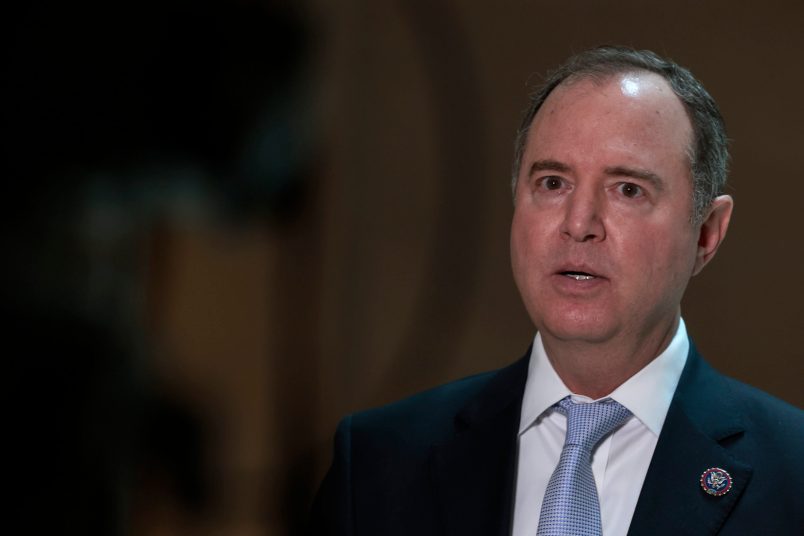Rep. Adam Schiff (D-CA), a member of the Jan. 6 Select Committee, on Sunday criticized the Justice Department’s decision to decline contempt of Congress charges against former Trump White House chief of staff Mark Meadows and deputy chief of staff Dan Scavino.
In response to the DOJ’s decision, committee chair Rep. Bennie Thompson (D-MS) and vice chair Rep. Liz Cheney (R-WY) decried the move as a “puzzling” development in a statement issued Friday evening, which noted former White House trade adviser Peter Navarro’s indictment earlier that day for defying the panel’s subpoena.
Schiff reiterated that sentiment during an interview on CBS, saying that the Trump associates who dodged contempt charges from the DOJ are not immune from all prosecution.
“It is very puzzling why these two witnesses would be treated differently than the two that the Justice Department is prosecuting,” Schiff said, referring to Navarro and former Trump White House chief strategist Steve Bannon, who was also charged by the DOJ with contempt last year. “There is no absolute immunity.”
Schiff said Trump associates such as Meadows and Scavino could offer “very relevant testimony” about what led up to the violence of Jan. 6, and the propagation of the Big Lie of a “stolen” election.
He finds the DOJ’s decision to not pursue charges against Meadows and Scavino a “deeply troubling” move that could impede the committee’s investigation into the events surrounding the deadly Capitol insurrection.
“When the statute requires the Justice Department to present those cases to the grand jury, they don’t, is deeply troubling,” Schiff said. “We hope to get more insight from the Justice Department, but it’s, I think, a grave disappointment, and could impede our work if other witnesses think they can, likewise, refuse to show up with impunity.”
Asked whether the Trump associates’ claims of executive privilege played into the DOJ’s decision, Schiff denied the validity of that rationale.
“That shouldn’t be the explanation here because of course there are great many things these witnesses can testify with no even plausible claim of executive privilege,” Schiff said, citing Meadows’ and Scavino’s involvement in the Trump campaign as well as documents they could provide.
Schiff argued that the DOJ’s decision could set up a “dangerous precedent” for other possible witnesses the committee is interested in hearing from.
“None of this is protected by privilege and the idea that you can simply refuse to show up rather than show up and say as to this question, I’m going to exert a privilege, that just invites others to be in contempt of Congress or be in contempt of judges around the country, in other courtrooms, and I think it’s a very dangerous precedent to set,” Schiff said.
The DOJ’s decision came hours after Navarro’s indictment on Friday for his failure to cooperate with the committee. Navarro was charged with two counts of contempt of Congress for refusing to provide testimony to the panel. The committee subpoenaed Navarro in February, requesting information about former President Trump’s election steal scheme. As part of his efforts to do Trump’s bidding, Navarro conceived a half-baked plan dubbed the “Green Bay Sweep” with Bannon to challenge the election results. The plan, which never came to fruition, would have involved then-Vice President Mike Pence rejecting Electoral College slates from states that Joe Biden won, delaying the Jan. 6 certification of his victory.
The House voted to charge Meadows and Scavino with contempt in April, after they briefly engaged in negotiations with the committee’s lawyers. Both Meadows and Scavino made claims of executive privilege as their rationale for refusing to cooperate with the committee’s probe.
Meadows had a brief stint of cooperation with the panel, however, in which he handed over thousands of texts and emails related to Jan. 6. Meadows ultimately reversed course and refused to cooperate. Meadows sued the committee, its members, and House Speaker Nancy Pelosi (D-CA) in an effort to block the enforcement of the panel’s subpoena.
Scavino previously headed up Trump’s Twitter account prior to the former president’s ban from the platform in the aftermath of the Capitol insurrection. Scavino was reportedly with the then-President the day before the attack as Trump tried to convince lawmakers into blocking the certification of Biden’s electoral victory.
Watch Schiff’s remarks below:







“Meadows had a brief stint of cooperation with the panel, however, in which he handed over thousands of texts and emails related to Jan. 6. Meadows ultimately reversed course and refused to cooperate.”
This sounds a lot like an “I obeyed the law in the past so that makes up for and erases this infraction” defense.
I’m going to go out on a limb and say it’s because they are slated to face worse charges.
I also can’t shake the lingering idea that there’s some times when you want the fuckers running around doing their thing in hopes that they lead you places and make further mistakes.
We shall see…
Or maybe just that it could make it harder to get a jury to go with conviction.
I think those of us who want to see the likes of tRump and his minions indicted and sent to prison are going to have to be satisfied with the little crumbs we’re being tossed (Navarro). I hope I’m wrong but I just don’t see Garland as having the intestinal fortitude to go there. He is so bent on appearing non-political that he appears to be a GQP plant. Or it could be the reason he won’t go there is that horse head he woke up next to.
So, is the J6C response to the DOJ decision coordinated with DOJ as part of a strategy, or is there really a rift between the two?